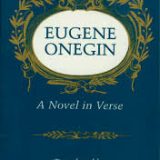Eugene Onegin – Alexandr Pushkin – 1825
Reviewed by: Ekaterina Mamyshev Date: 22 July 2003
I will say from the very beginning that I read this work in Russian, and can speak for the Russian version only – I know absolutely nothing about the translations (although I am positive they are horrible and come nothing close to the original). However, from what I heard from other Russians, Vladimir Nabokov’s translation is supposed to be pretty good.
In Russia, Eugene Onegin is as classic as Dickens and Poe are in Anglo-American heritage. Therefore, it deserves an indulgence. Of course, in terms of its style and form it is impeccable – it flows like the sound of a winding brook between the rocks on a summer night combined with the choir of evening birds. It has grace, charm, humor…in other words, everything that makes leisure reading enjoyable. However, in terms of content, I was disappointed. The highest focus and aspiration of the author, the reason why life is worth living, is only love. That is high enough by standards of literature, both former and contemporary, but I was expecting something greater.

Reviewed by: Michael Sympson Date: 17 September 2001
Falen did as good a job as possibly could be done, – and yet … . Poetry can be defined in many ways, and what ever your college teacher is telling you, it is not about ideas and opinions. Collapsible soapboxes have nothing to do with art. Diction, sensitivity, sensual quality, lucidity of image and thought, and fantasy is what we should be looking for. Poetry is sensual thought. It doesn’t pontificate, it has no message. Poetry is a mode of perception and representation, the poet’s way to interface with his world. In the beginning was the word, and the word became flesh in the poet; in the beginning was a vision, in the beginning was magic, and if it is poetry it should come across as magic.
Eugene Onegin is a novel in verses. Onegin, Lensky and Tatiana are rounded characters. The story has few incident but drifts along with grace and plausibility, and the narrator now and then adds his own little aside. The big problem is the medium. I have no Russian, so I have to take for granted, that there is a very good reason for the way Pushkin is idolized in his country. From what I hear, his poetry has a light and graceful touch and a natural and unobtrusive bent that seemingly effortless follows every turn and angle of mood and perception. It speaks at least for Falen’s ambition that he took on himself the laudable task to recreate Pushkin’s stanza and rhyme scheme.
Falen’s knack for sniffing out suitable rhymes is admirable. But I bet my piggybank, that from a purely statistical point of view, the number of rhymes in Russian must outweigh the translation by a ratio of 1:3 at least. In English choices are limited (I of all people should know) and there is nothing anybody can do about. For short poems this doesn’t pose a serious problem. But the longer a narrative poem, the more likely will the original’s carefully crafted counterpoint of rhyme words translate to a mindless and purely ornamental jingle, that is comical at best, or just plain annoying, because it diverts the reader’s attention from what the author has to say, or even worse, simply drowns in noise the subtler touches.
In a good poem, rhyme words are semantic anchor points, which toss on the ball to their resounding companions. For English prosody this means, there has to be a sufficient distance between the echoing pairings; a minimal length of the line is required to avoid unintended humor, and it has to be assisted by numerous enjambments to suppress the ding dong even further. A good rhyme is semantically justified and at the same time unobtrusive. Unfortunately an English imitation of Pushkin’s short tetrameter turns up the noise of the rhyming even further. It also makes the enjambments unrecognizable because it draws all the attention to a line’s ending. Besides, in this day and age, any kind of poetry is expected to stay clear from the two extremes of being merely candy for the ear or an agglomeration of slick and self-serving sound-bites. Poetry is not a stand-up routine.
I don’t know what in Russian is doing the trick, but I do know it doesn’t work for a long poem in English if it isn’t more of a satirical parody, like Byron’s “Don Juan.” Nabokov had a point, when he launched his savage attack on Arendt’s translation; but that doesn’t mean he was right in principle. Evolution took a couple of billion years to come to the present point. Good translations climb on the shoulders of lesser predecessor’s and Falen’s effort is certainly the best performance, today’s money can buy. But it might not be the last word. Pushkin had intended it to be a melancholy and mildly witty narrative with wide swinging vistas and sensual perceptions of great beauty. In some places, Falen’s rendition gives it the appearance of a burlesque dance, breathlessly speeding along, like the high kicking cancan in a vaudeville show. And this, certainly, does Pushkin no justice.
However, being a translator myself, I am not prepared to concur with Nabokov’s defeatist position on the possibility of producing a rendition that is equally faithful to content and structure and doesn’t fall into the trap of padded jingles. It can be done and Falen in more than one passage came close to it















